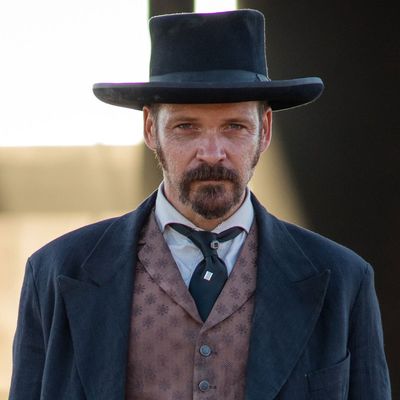
Antoine Fuqua’s remake of The Magnificent Seven is, for the most part, a straight-faced action-Western. Denzel Washington plays the pure-hearted leader of men; Chris Pratt is the comic relief; Ethan Hawke’s character has to overcome his troubled past. Men in leather ride horses and shoot revolvers with implausible skill; there are saloon doors and prostitutes, a dusty main street and helpless locals. But within this otherwise archetype-collecting remake of a remake, a more eccentric force lurks — and that’s a phlegmy Peter Sarsgaard, acting absolutely batshit insane.
One of our best character actors, Sarsgaard tends to oscillate between mild-mannered men caught in bad situations (The Slap, Blue Jasmine) and bizarre and/or menacing weirdos (Black Mass, Experimenter, Night Moves). His eccentricity has always kept him slightly out of touch with the mainstream, which makes his casting in The Magnificent Seven so ingenious: While he’s been villainous before, he hasn’t played an out-and-out bad guy in the movies since, uh, The Green Lantern, which, hey, a guy’s gotta eat. But as Magnificent Seven’s Bartholomew Bogue, the megalomaniac robber baron who threatens the village that Denzel & Co. pledge to protect, Sarsgaard was given an unapologetically antagonistic role to chew on — though saying that Sarsgaard “chews on” this role is like saying a shark chews on your leg.
More accurately, Sarsgaard works himself into a frenzy, his eyes swollen and bloodshot, his voice a wet, throaty rasp. His performance is both campy and sincere, an over-the-top embodiment of villainy that gives the staid Magnificent Seven a desperately needed shot in the arm; the few times he appears onscreen, it’s like David Lynch or the Coens beamed in to help quirk up Fuqua’s world. Sarsgaard plays Bogue as a man who is physically unwell, and the agony he appears to be in offers a sort of subliminal explanation for why he’s such a dick — a question the movie never does directly address. In interviews, he’s cited Bogue’s “sense of his own grandeur” and compared him to Trump; like all great character actors, Sarsgaard makes the part come alive totally aside from the machinations of the story. I’d watch Bogue pick up his dry cleaning.
But more than just enlivening this film, Sarsgaard as Bogue joins a very particular category of performance: the bonkers-hysterical big bad. It’s a very specific type of villain, one that tends to appear in the lower-brow works of interesting filmmakers, and most of the time it comes from an actor doing their best to take over a lesser part. While there are plenty of examples of this phenomenon, some of them dating back decades, the best recent example is easy to find: Eddie Redmayne, whispering inexplicably and using every muscle in his face to turn Balem Abrasax, the villain of the Wachowskis’ otherwise disastrous Jupiter Ascending, into a subject worthy of his talents. Even if you don’t necessarily think the acting Redmayne does in the film is what you might qualify as “good” — and I would, sincerely, argue that it is — it’s certainly interesting, and often incredibly so; he gives one of the strangest performances I’ve ever seen in a studio film.
A similar highlight comes from Christopher McQuarrie’s Jack Reacher, a movie that never quite merits the enormous abilities of either McQuarrie or its star, Tom Cruise. In lesser hands, Jack Reacher could’ve gone straight to VOD — it’ll be interesting to see how director Edward Zwick handles the sequel — but McQuarrie is too good a filmmaker to not make it work. One of the flourishes he adds to the movie is casting Werner Herzog, legendary German director and possessor of one of cinema’s great voices, as the villain, a crime boss called “the Zec,” which apparently means some variation of “the prisoner.” Very few actors could’ve given the Zec the kind of menace that Herzog does; in his best scene from the movie, he manages to be terrifying without so much as moving his body. Instead, Herzog uses that musical instrument of a voice to tell a story about the time he chewed his fingers off in a Siberian labor camp, then demand that an underling who disappointed him do the same. It’s deranged and very entertaining, far above the typical stuff of your adapted action flick.
Of course, the precedent for this kind of character acting goes back well before 2012, and beyond just mediocre blockbusters. In the post-war era, Robert Mitchum pioneered it with his work in The Night of the Hunter and Cape Fear, and Lynch tends to be a connoisseur of such performances, including Dennis Hopper in Blue Velvet and Robert Blake in Lost Highway, one of the weirdest movies ever made. But (spoiler alert) when, at the end of Magnificent Seven, Sarsgaard is reduced to groveling for his life on the ground in front of Washington, he calls to mind no one more than John Turturro as Bernie Bernbaum in the Coen Brothers’s superb Miller’s Crossing. In that moment, Sarsgaard shows that even in what might otherwise be just disposable entertainment, good actors find a way to leave an impression.

